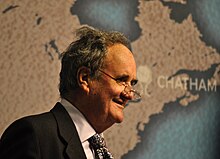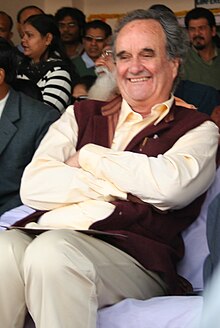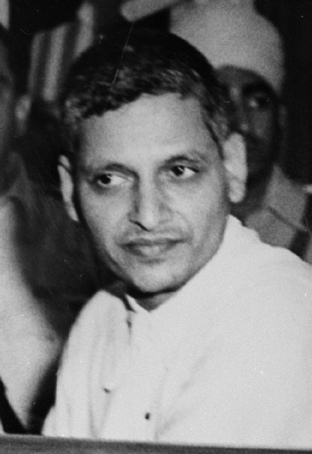
Nathuram Vinayak Godse was the assassin of Mahatma Gandhi. He was a Hindu nationalist from Maharashtra who shot Gandhi in the chest three times at point blank range at a multi-faith prayer meeting in Birla House in New Delhi on 30 January 1948.

The Rashtriya Swayamsevak Sangh is a Hindu nationalist paramilitary volunteer organisation in India. The RSS is the progenitor and leader of a large body of organisations called the Sangh Parivar, which have presence in all facets of the Indian society, including the Bharatiya Janata Party, the ruling political party in India under Narendra Modi, the incumbent Indian prime minister. The present Sarsanghchalak of the RSS is Mohan Bhagwat.
Hindutva ("Hindu-ness") is the predominant form of Hindu nationalism in India. The term was formulated as a political ideology by Vinayak Damodar Savarkar in 1923. It is used by the Rashtriya Swayamsevak Sangh (RSS), the Vishva Hindu Parishad (VHP), the Bharatiya Janata Party (BJP) and other organisations, collectively called the Sangh Parivar.
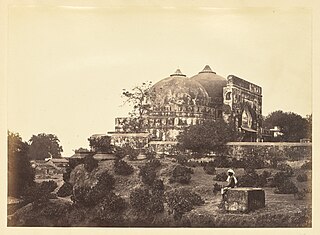
Babri Masjid was a mosque in Ayodhya, India, at a site believed by many Hindus to be the birthplace of Hindu deity Rama. It has been a focus of dispute between the Hindu and Muslim communities since the 18th century. According to the mosque's inscriptions, it was built in 1528–29 by Mir Baqi, a general of the Mughal emperor Babur. The mosque was attacked and demolished by a Hindu nationalist mob in 1992, which ignited communal violence across the Indian subcontinent.

Lal Krishna Advani is an Indian politician who served as the 7th Deputy Prime Minister of India from 2002 to 2004. Advani is one of the co-founders and a senior leader of the Bharatiya Janata Party. He is a long time member of the Rashtriya Swayamsevak Sangh, a volunteer organisation. He also served as Minister of Home Affairs in the BJP-led National Democratic Alliance government from 1998 to 2004. He was the Leader of the Opposition in the 10th Lok Sabha and 14th Lok Sabha and also the longest serving person of this post. He is widely considered architect of Hindutva politics and was the power centre of BJP in 1990s. He was the Prime Ministerial candidate of BJP in 2009.
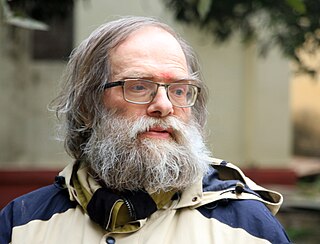
Koenraad Elst is a Flemish right wing Hindutva author, known primarily for his support of the Out of India theory and the Hindutva movement. Scholars have accused him of harboring Islamophobia.

Vinayak Damodar Savarkar, Marathi pronunciation: [ʋinaːjək saːʋəɾkəɾ];(28 May 1883 – 26 February 1966), was an Indian politician, activist, and writer. Savarkar developed the Hindu nationalist political ideology of Hindutva while imprisoned at Ratnagiri in 1922. He was a leading figure in the Hindu Mahasabha. He started using the honorific prefix Veer meaning "brave" since he wrote his autobiography. Savarkar joined the Hindu Mahasabha and popularized the term Hindutva (Hinduness), previously coined by Chandranath Basu, to create a collective "Hindu" identity as an essence of Bharat (India). Savarkar was an atheist.
Pran Kumar Sharma, better known as Pran, was an Indian cartoonist best known as the creator of Chacha Chaudhary (1971). He also created other characters like Shrimatiji, Pinki, Billoo, Raman, and Channi Chachi.
The Liberhan Commission was a long-running inquiry commissioned by the Government of India to investigate the destruction of the disputed structure Babri Masjid in Ayodhya in 1992. Led by retired High Court Judge M. S. Liberhan, it was formed on 16 December 1992 by an order of the Indian Home Union Ministry after the demolition of the Babri Masjid in Ayodhya on 6 December and the subsequent riots there. The commission was originally mandated to submit its report within three months. Extensions were given 48 times, and after a delay of 17 years, the one-man commission submitted the report to Prime Minister Manmohan Singh on 30 June 2009. In November 2009, a day after a newspaper published the allegedly leaked contents of the report, the report was tabled in Parliament by the Home Minister P. Chidambaram.

François Gautier is a journalist based in India who served as the South Asian correspondent for multiple reputed French-language dailies. He advocates for an Indigenous Aryan narrative.
Braj Basi Lal was an Indian writer and archaeologist. He was the Director General of the Archaeological Survey of India (ASI) from 1968 to 1972 and has served as Director of the Indian Institute of Advanced Studies, Shimla. Lal also served on various UNESCO committees.

Kalyan Singh was an Indian politician and a member of the Bharatiya Janata Party (BJP). He served twice as the Chief Minister of Uttar Pradesh and as a Member of Parliament. He was the Chief minister of Uttar Pradesh during the demolition of the Babri Masjid in December 1992. He was considered an icon of Hindu nationalism, and of the agitation to build a Ram temple in Ayodhya.
Madhav Vittal Kamath was an Indian journalist and broadcasting executive, and the chairman of Prasar Bharati. He worked as the editor of The Sunday Times for two years from 1967 to 1969, as Washington correspondent for The Times of India from 1969 to 1978 and also as editor of The Illustrated Weekly of India. He had also written numerous books and was conferred with the Padma Bhushan award in 2004.He was born in a brahmin family

Pablo Bartholomew is an Indian photojournalist and an independent photographer based in New Delhi, India. He is noted for his photography, as an educator running photography workshops, and as manager of MediaWeb, a software company specialising in photo database solutions and server-based digital archiving systems.
Tan Chung is an authority on Chinese history, Sino-Indian relations and cultural exchange. He has been a doyen of Chinese cultural studies in India for nearly half a century.
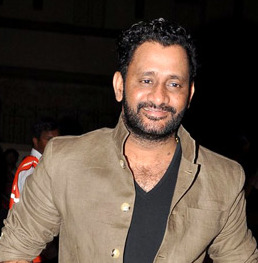
Resul Pookutty is an Indian film sound designer, sound editor and audio mixer. He won the Academy Award for Best Sound Mixing, along with Richard Pryke and Ian Tapp, for Slumdog Millionaire. Pookutty has worked in Hindi, Tamil, and Malayalam languages in addition to British films.
Hindu Revolution is a term in Hindu nationalism referring to a sociopolitical movement aiming to overthrow untouchability and casteism to unified social and political community to create the foundations of a modern nation.

The demolition of the Babri Masjid was illegally carried out on 6 December 1992 by a large group of activists of the Vishva Hindu Parishad and allied organisations. The 16th-century Babri Masjid in the city of Ayodhya, in Uttar Pradesh, India, had been the subject of a lengthy socio-political dispute, and was targeted after a political rally organised by Hindu nationalist organisations turned violent.
Ram Janmabhoomi Nyas is an organisation which was formed as a trust to promote and oversee the construction of a temple in Ayodhya, India at the Ram Janmabhoomi, the reputed site of the birth of Rama, the seventh and one of the most popular Avatars of Hindu God Vishnu. The Nyas was formed by members of the Vishva Hindu Parishad.
Kutikuppala Surya Rao is a physician in HIV medicine. He hails from a village named Kintali, located in the Srikakulam district of Andhra Pradesh, India.
